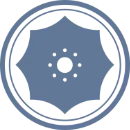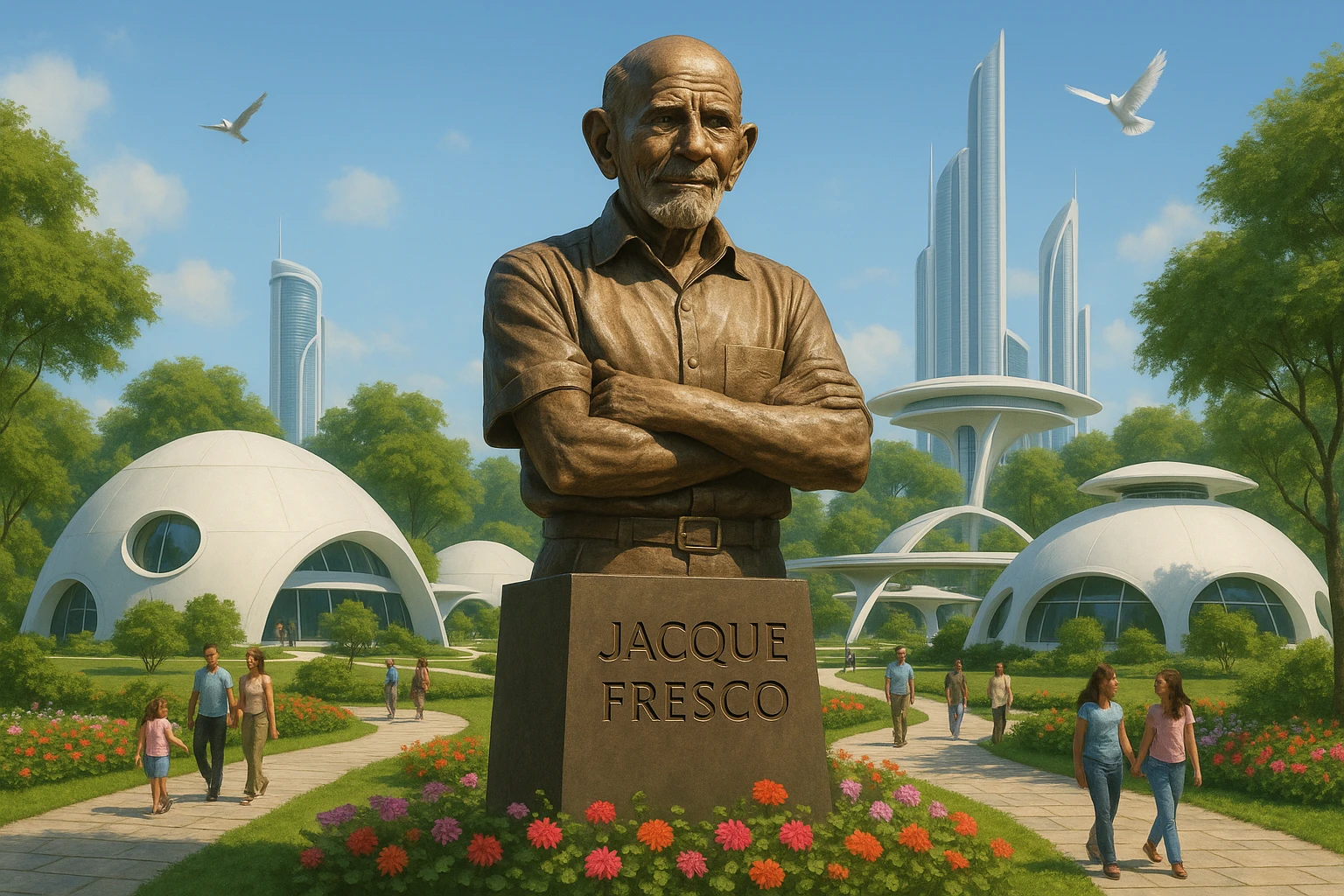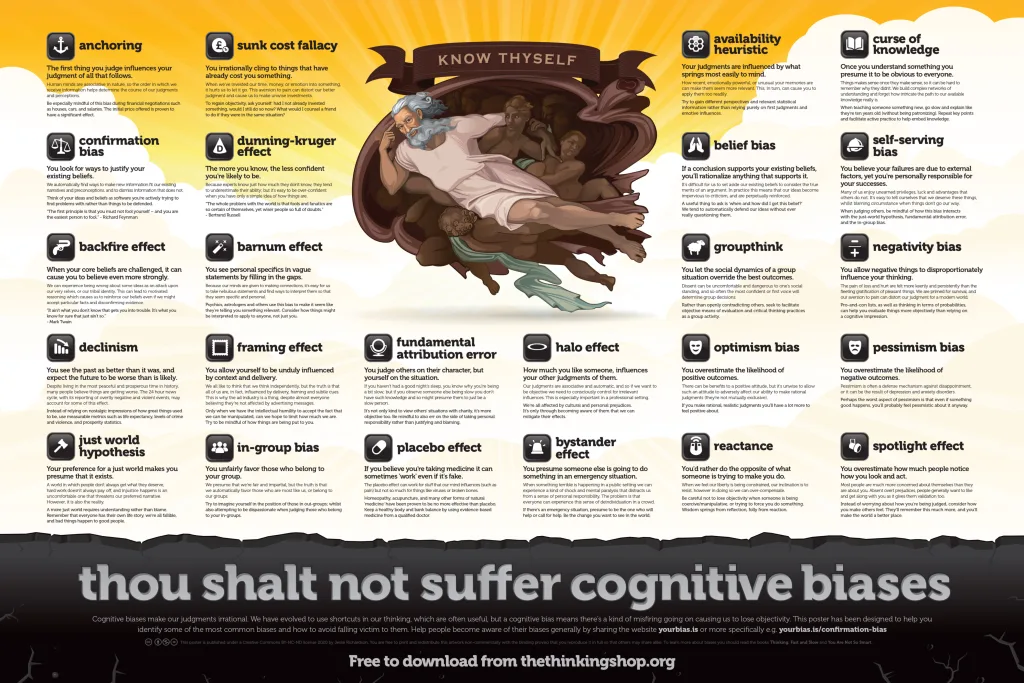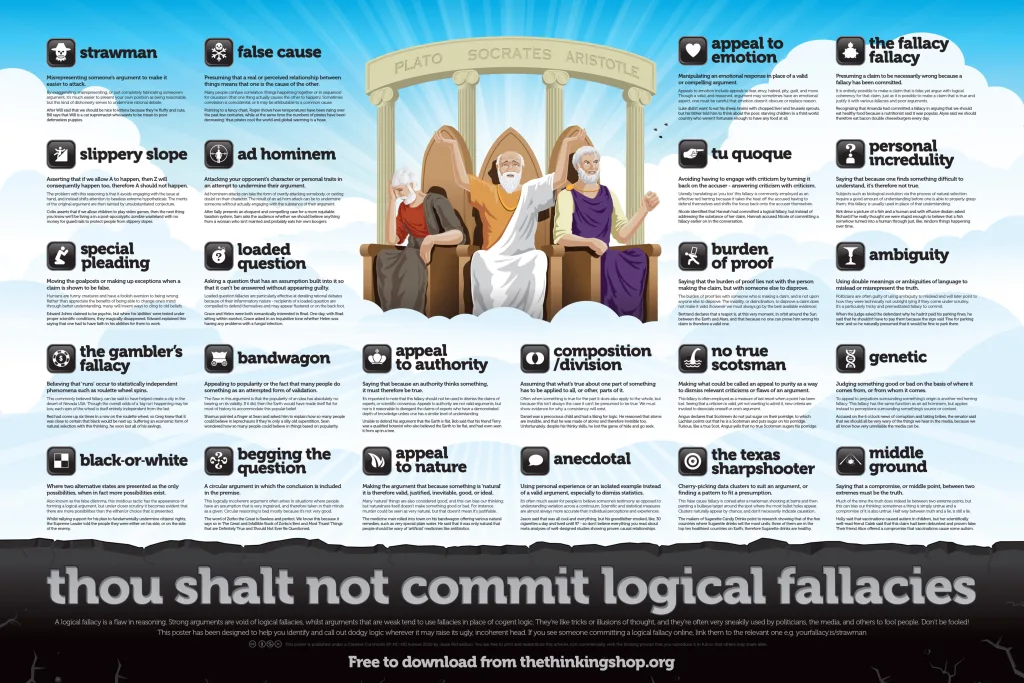Jacque Fresco was a famous industrial designer and futurist who dedicated his life to imagining a world without poverty, war, or scarcity—a world made possible through science, automation, and intelligent management of resources. His vision, known as The Venus Project (pre 2018), proposed cities designed to serve everyone, using technology to meet human needs and create a better future for all.
Jacque Fresco’s phrase, “Don’t build me a monument”, has become one of his most quoted lines. People repeat it at every opportunity, attaching any convenient meaning they wish to it. At times, it reaches the point of absurdity: there are those who seriously claim that the mere existence of our YouTube channels “Jacque Fresco” (on Russian and Ukrainian) or themed groups on social media is already an “unwanted monument” that should be taken down since “he didn’t want monuments.” Under every post or video mentioning Jacque, you’ll find comments scolding, “He asked not to be turned into a cult!”
But the most dangerous trend begins when this phrase is used as a tool for logical manipulation—to dismiss Jacque’s ideas and the original The Venus Project, or even to erase them entirely.
What Jacque Fresco Actually Meant
Jacque Fresco spoke about the idea of a “monument” many times, and each time, he was not calling for people to stop mentioning his name or to abandon his ideas. What he meant was that no design or concept should become a dogma or a cult, even if it is excellent for its time. He emphasized that future generations should improve and redesign everything we have created—that is the essence of progress.
For example, in a 2010 London interview, he shared that he had read the book 125 Utopias and Why They Failed, which made him realize that even if you design a perfect city today, tomorrow it could become a straitjacket for the children of the future.
They will grow up, gain new knowledge and technologies, and design their own cities.
Fresco said, “By putting up a monument to me in front of a city, you are holding back the future.” He compared it to a laptop, explaining that your current laptop isn’t perfect; it’s simply the best option available right now, and in ten years, it will be outdated. Progress cannot be stopped, which is why talking about a utopia—an ideal society—is pointless. Everything can be improved, and there should be no “untouchable” ideas or authorities.
Jacque expressed a similar thought during his talk in Stockholm that same year. Explaining that The Venus Project is not a final, perfect model but rather a much better starting point compared to today’s society, he added:
“Even if I design a functioning city, that city will only tie the hands of the next generation. They will design their own cities. If you build a monument to me and put it in the center of the city, it will hold people back. To move forward, you need to set goals, analyze, improve, and keep going.”
In other words, there is no need to “immortalize” today’s designs—the future should not be built on worshiping what was achieved in the past, but on continuously improving it.
The phrase “don’t build me a monument” was aimed at dogma and stagnation, not at denying credit or the sharing of knowledge. Fresco did not want his projects or himself to become a sacred cow that would hold back progress. He never said, “erase my name, throw away my books, delete my videos.” On the contrary, he spent his entire life trying to share his ideas as widely as possible—he simply understood that, over time, these ideas would also need to be improved and developed further.
Erasing Jacque Fresco Under the Pretext of “Avoiding a Cult”
Sadly, Jacque’s words about monument became a convenient cover for those who, after his death in 2017, decided to radically change the direction of the project. The new directors of The Venus Project, appointed in 2018, announced the “next evolution” of the project—and this “evolution” quickly took a strange turn. Many of Jacque Fresco’s original proposals were declared outdated and effectively discarded.
Almost all information about Jacque Fresco’s original proposals, as well as materials about him personally, has disappeared from The Venus Project’s website, with rare exceptions. The Program, Frequently Asked Questions, transition plans, and other key materials have been removed, leaving only brief, generic mentions of the project’s former direction. Now, many of Jacque’s ideas, lectures, and books are available only as paid products in the store: you can purchase them, but you can no longer freely access them in full.
The website museum, which was planned as an alternative to the erasure of Jacque’s legacy and was meant to be called the “Jacque Fresco Foundation,” has remained “under construction” for five years and is essentially an abandoned site with only a couple of pages.
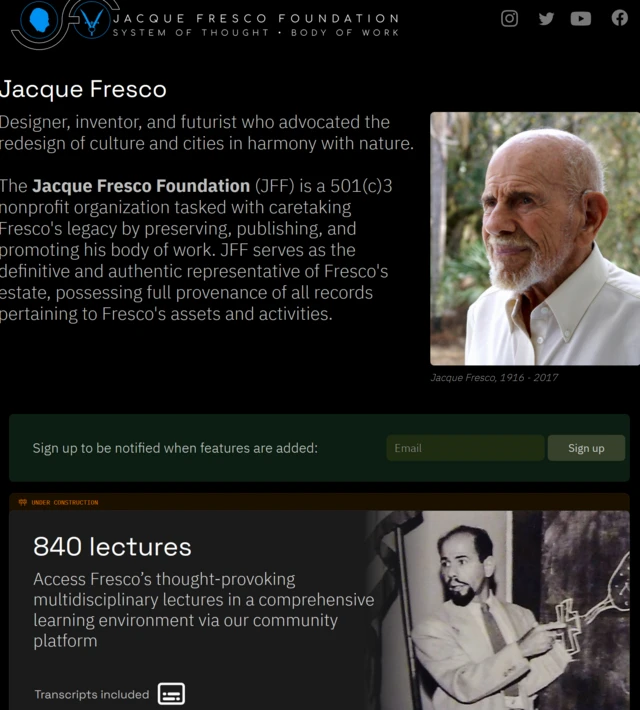
It is also worth mentioning that production was completely halted on the documentary The Man of Tomorrow (about Jacque Fresco), and there has been a refusal to publish Jacque’s archived lectures and their transcripts, despite multiple crowdfunding campaigns that were held for this purpose.
Requests for access to archival materials for new videos and documentaries—which our team was ready to create—were also denied. In addition, plans for a Major Feature Film of The Venus Project, intended to vividly illustrate our potential future and the transition toward it (for which funds were also raised), were quietly scrapped and forgotten. The idea to publish a book outlining Jacque’s core proposals, based on his lectures and announced by the new directors as nearly complete back in 2020, was also never realized.
Any attempts at collaboration are met with a demand to unconditionally accept the new direction and to hand over full control to the directors and their chief ideologue, Simon Michaux—“a special scientist and visionary” who is now positioned as the project’s hope instead of Jacque Fresco, despite Michaux’s fascination with conspiracy theories and pseudoscientific concepts.
And yet, despite all of this, the new leadership insists that they are “not straying from Fresco’s ideas.” They frequently reference Jacque’s statements—or rather, carefully selected quotes taken out of context. The phrase “don’t build me a monument” has become their favorite justification. The logic goes: since Fresco himself said not to turn him into an icon, they are now free to abandon his plans, designs, and ideas and replace them with something entirely different. If anyone points out the contradictions between the new direction and Fresco’s own words, the response is always: “Jacque didn’t want his words to become dogma, so we’re simply offering an ‘evolution’ of his ideas.”
But What Do We See in Practice?
The conversation has shifted from a resource-based economy of abundance to the idea of inevitable resource scarcity—particularly the resources needed for transitioning to renewable energy. Relying on Simon Michaux’s unique calculations, which have not received support from the scientific community, the new direction uses these claims to justify a complete reinterpretation of Jacque’s ideas and a push toward a “simpler life” in harmony with nature.
The project has moved away from the scientific method and toward a distrust of “mainstream science,” promoting the idea of a “new scientific method based on philosophy” (whatever that means). It is worth mentioning Nathaniel Dinwiddie, a member of the board of directors: a philosophy graduate from the University of Kansas, he now actively uses his skills to reinterpret Fresco’s ideas and skillfully manipulate logic and meaning.
The project has shifted from emphasizing automation and technological development to rhetoric claiming that humanity has “advanced too quickly” and needs to slow down—or even reverse course. Discussions about practical projects are increasingly being replaced with plans to create a “Prometheus Institute,” aimed at studying “ether energy,” supposedly hidden by mainstream science, and attempting to invent a perpetual motion machine to solve the world’s problems.
From the idea of a money-free society where goods are available to all through science and automation, what remains now is only the possibility of “free” labor in a mine or on a farm simply to survive.
Fresco’s emphasis on avoiding politics has also been lost. In its place, a pseudo-political structure is being formed, where a group of “philosopher-monks” decides what the “ideal state” should look like, mixing together ideas from every system—even fascism—and proposing to reshape society according to their preferences, swapping out systems whenever they choose. Along the way, they even invite indigenous shamans for consultations.
A Convenient Excuse
Those who disagree with the new direction are simply removed. The project has turned into a closed citadel with non-disclosure agreements, no feedback channels, and mass blocking of any criticism. English-language platforms where Fresco’s ideas could still be discussed have been shut down, and public spaces have been cleared of those who disagree with the “new line.”
Using Fresco’s phrase, “don’t build me a monument,” has become a convenient tool for manipulation. A single fragment of Jacque’s words is taken while ignoring everything else, using it as an argument against any reminders of his real ideas and proposals—or any form of criticism. The result is the illusion that abandoning Fresco’s legacy is somehow what he would have wanted.
In reality, this pretext is used to discard the project’s core principles: the scientific approach, the focus on eliminating scarcity, and the creation of a society of abundance. Instead, entirely different views are promoted, pushing Jacque and his ideas into the background while leaving only a slogan to silence dissent and divert the discussion away from the core issues. Fresco dreamed that his ideas would help change the world. He never dreamed that, after his death, a single phrase of his would be used to justify abandoning everything he worked to build.
Download the logic manipulation posters from the project Your Logical Fallacy Is
When honest arguments run out, rhetorical tricks begin. It is important to recognize this and not fall for it. To protect yourself, it is worth studying logical fallacies, sophistry, rhetorical techniques, and methods of manipulation and emotional pressure. This will help you identify the substitution of concepts, false appeals to authority, and other tactics used to divert conversations and silence genuine criticism.
Not Monuments, but Continuing the Work
What should those who truly value Jacque Fresco’s ideas do? Continue the work he began. Today, the original Venus Project has reached a dead end, and hopes of returning to its initial direction are fading. Legal and administrative barriers make it difficult to share Jacque’s original materials: the new owners control the rights to his books, lectures, and films, making it increasingly hard to share them freely. For example, we were prohibited from using even archival footage of Jacque under the pretext of copyright. But this is no reason to give up.
Jacque created a foundation of knowledge not so his ideas would remain frozen, but so they would be developed, adapted, and improved. Yes, much has to be started again, but we are not starting from scratch. We have a knowledge base, Jacque’s body of work, our team’s experience, and partnerships ready to launch smart city projects. The path is not easy, but we continue to move forward. Everyone who shares these views can contribute.
If you care about the original ideas of The Venus Project, now is the time to help revive them—through financial support, your time, your skills, joining a volunteer team, or launching your own projects aligned with the shared vision. The main thing is not to remain silent or stand on the sidelines.
Jacque did not want monuments. He wanted change. Let him be remembered not by statues, but by real actions that improve people’s lives. Develop ideas, stay critical, share knowledge. Then no manipulation will knock us off the path to the future we all deserve.
To everyone ready to act, we invite you to join us. Instead of building monuments, let’s build a new world.
Read more:
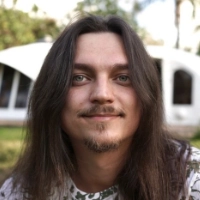
I have been at the center of all this dirrection for over 13 years and can tell you a lot of things, from detailed explanation of Jacque Fresco’s original proposals, to experience of working with the movement, to little known and insider information.
I have organized the most successful and effective team of The Venus Project movement, now represented by Designing The Future, as well as the 1.5 million subscriber Jacque Fresco channel, small and large events, radio and TV interviews, working with universities and schools, organizing events, running a network of groups in 60 cities with regular meetings, and much more. Exposed and fought fraudulent companies and initiatives to protect The Venus Project’s reputation.
Organized and negotiated the construction of The Venus Project’s smart city, with the then living Jacque Fresco, which was their best chance. This has now evolved into a full-fledged smart city project and test site for the development of the entire industry of smart cities, called “Mission on Earth”, which will be launched soon, late 2024-early 2025, and we’re directly involved.
After the new directors of The Venus Project changed course, I strongly opposed it without hesitation, especially knowing the details of the gamble – taking the side of Jacque Fresco’s original ideas. Whatever the outcomes, I will continue what I have started, with the goal of giving humanity a chance to move toward a resource-based economy, or at least to point society in the right direction. I hope you will join us.
